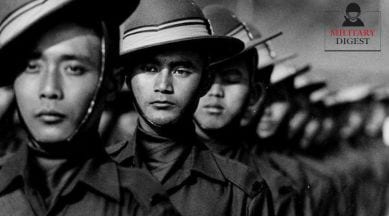Stay updated with the latest - Click here to follow us on Instagram
Military Digest: When Gorkhas were recruited into Punjab Armed Police
Lately, there have also been reports that the Chinese have shown interest in the recruitment of Gorkhas from Nepal for their Army and that Nepalese citizens have been volunteering for fighting in the Russia-Ukraine war by enlisting in private militias like Wagner Group.

The recruitment of Nepalese Gorkhas in the Indian Army is in limbo due to the introduction of the Agniveer scheme of recruitment. The Nepalese government has not agreed to the Agniveer scheme and wants the old process of recruitment for its citizens in the Indian Army to continue.
As a result, Nepalese-domiciled Gorkhas have not been recruited in the Indian Army ever since the new recruitment cycle began in 2022. Only Indian-domiciled Gorkhas are being inducted as of now.
monthly limit of free stories.
with an Express account.
The issue has attracted a lot of comments from retired senior officers of the Gorkha Rifles who feel that the Indian Army must continue to recruit Gorkhas from Nepal even if it means giving special concessions to them in the Agniveer scheme or retaining the old recruitment pattern for them.
The age-old ties with Nepal are being cited as the reason for continuing the close military bond between the two nations. Lately, there have also been reports that the Chinese have shown interest in the recruitment of Gorkhas from Nepal for their Army and that Nepalese citizens have been volunteering for fighting in the Russia-Ukraine war by enlisting in private militias like Wagner Group.
While the Gorkhas have been a part of the Indian Army for a long time and have also been recruited in the armed police forces in several states like Bihar and West Bengal among others but many don’t know that Punjab Police too had recruited a handful of Nepalese Gorkhas in its ranks soon after Partition.
The National Archives of India contains correspondence between the then-home secretary of Punjab and the Ministry of Home Affairs (MHA) in 1951, where the regularisation of these Gorkhas was discussed.
In January 1951, the then home secretary of Punjab, Vishan Bhagwan, wrote to the MHA secretary, seeking the verification of character and antecedents of the 17-odd Gorkhas who had been recruited in the state’s Provincial Armed Police (now known as Punjab Armed Police).
The letter mentioned that just after Partition, a number of Gorkhas of Nepalese nationality were temporarily enlisted in the Provincial Armed Police due to the shortage of men at the disposal of the Punjab government to undertake multifarious duties, including the protection of the boundary.
“Some of these Gurkhas [now referred to as Gorkhas] have given ample proof of their efficiency and the Commandant, Provincial Armed Police, Punjab, has recommended their permanent absorption in the force as they cannot be retained indefinitely on a temporary basis. But this cannot be done unless the Nepal government are prepared to verify their character and antecedents and further agree to their arrest and extradition in the event of any one of them being wanted for trial for any offence,” the letter said.
The letter went on to request that the matter be taken up with the Nepal government for verification of the antecedents of the Gorkhas from the districts in Nepal to which they belonged.
The request to MHA led to protracted correspondence with the MHA pointing out that the verification of Gorkhas of Nepalese nationality recruited by the Army is not carried out by civil authorities.
“All such recruits are brought in by paid recruiters of the recruiting organisation who are held responsible for their antecedents. In certain special cases, the government of Nepal are approached for the verification of antecedents of Nepalese nationals who are recruited into the Army with their consent. In the present case the state government do not appear to have obtained the approval of the government of Nepal for recruiting the Gurkhas in their police force,” MHA wrote back to the Punjab government in July 1951.
MHA had sought the remarks of the Adjutant General’s branch of Army headquarters in this regard before replying to the letter of the Punjab government. The MHA letter went on to say that it was not considered desirable to approach the government of Nepal for the verification of antecedents of the Gorkhas in Punjab’s Provincial Armed Police in light of these facts.
The Ministry of Defence, to whom the matter was also referred, concurred with the comments made by MHA in its reply to the Punjab government and said it was inadvisable to approach the Nepal government as their permission had not been sought to recruit the Gorkhas in Punjab.
It was finally agreed that since the Gorkhas in Punjab Provincial Armed Police had been in service for three years, their antecedents may be verified within India provided they can be taken as already domiciled or intending to be permanently domiciled in India by virtue of their having stayed here for over three years.
This conundrum may have hastened the end of the experiment of inducting Gorkhas into the Punjab Armed Police.